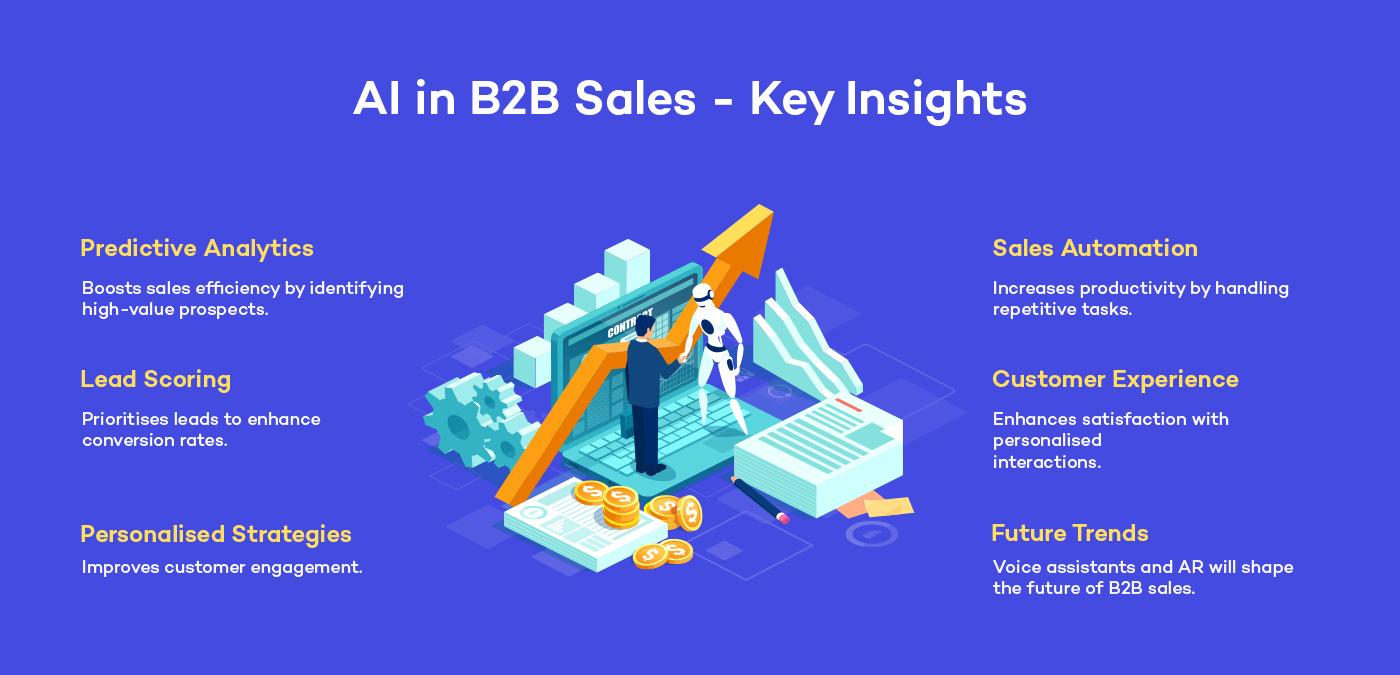Leveraging Growth Systems For B2B for smarter supply chain decisions
Wiki Article
Reinvent Your Organization: Just How AI Automation Is Transforming B2B Operations
AI automation is reshaping B2B operations in considerable methods. Business are adopting this modern technology to enhance operations and enhance efficiency. As jobs come to be automated, organizations can concentrate on strategic growth instead than mundane processes. The effects of these modifications are extensive, influencing whatever from client interactions to provide chain administration. Recognizing this change is important, as the future of organization depend upon the reliable assimilation of AI into day-to-day procedures. What lies in advance in this advancing landscape?Comprehending AI Automation in B2B Context
As organizations progressively seek performance, recognizing AI automation within the B2B context becomes vital. AI automation refers to the application of synthetic intelligence technologies to improve and improve organization procedures. In B2B settings, this can manifest in various kinds, such as automating information entry, optimizing supply chain logistics, or boosting supply monitoring. Organizations leveraging AI automation can decrease functional prices, decrease human mistake, and rise productivity. AI tools can evaluate substantial amounts of information to provide workable understandings, allowing informed decision-making. The combination of AI right into B2B procedures not only transforms traditional workflows yet likewise fosters dexterity and scalability, allowing companies to adapt to market adjustments quickly and effectively. Embracing this innovation is crucial for staying competitive in today's electronic landscapeEnhancing Consumer Experience Via AI
Exactly how can AI transform client interactions in the B2B field? AI improves client experience by giving individualized, prompt, and effective service. Intelligent chatbots and virtual assistants can deal with queries 24/7, making certain clients receive prompt feedbacks. Growth Systems For B2B. Anticipating analytics enable businesses to prepare for consumer needs, customizing offerings as necessary. AI-driven platforms can analyze consumer data, enabling targeted marketing techniques and boosted engagement. Furthermore, view evaluation devices analyze consumer responses, helping companies tweak their services. By automating routine tasks, AI frees up personnels to concentrate on high-value interactions, fostering more powerful partnerships. The assimilation of AI not only simplifies interaction yet likewise constructs trust fund and loyalty, eventually raising the general client experience in the competitive B2B landscape
Streamlining Supply Chain Management With AI
AI plays an essential function in optimizing supply chain administration through predictive analytics and automated inventory control. By leveraging anticipating analytics, services can expect demand variations and change their procedures appropriately. Automated inventory systems better boost effectiveness by making certain supply degrees are preserved, decreasing waste and boosting overall efficiency.Predictive Analytics Advantages
While lots of organizations encounter obstacles in handling complicated supply chains, anticipating analytics uses a transformative solution by leveraging large amounts of information to forecast fads and optimize operations. By analyzing historic information alongside real-time inputs, predictive analytics allows firms to identify patterns and anticipate future needs. This foresight permits more enlightened decision-making, improving performance and lowering expenses. Furthermore, companies can proactively deal with possible interruptions by forecasting supply chain bottlenecks and readjusting techniques accordingly. The combination of anticipating analytics not only boosts inventory management but additionally cultivates stronger connections with vendors and clients through prompt responses to market changes. Inevitably, the adoption of predictive analytics encourages organizations to remain affordable in a progressively vibrant company environment.Automated Supply Control
As services significantly depend on predictive analytics to optimize supply chain operations, automated inventory control emerges as a powerful ally in this effort. By leveraging AI-driven modern technologies, business can enhance accuracy in stock monitoring, reduce stockouts, and decrease excess stock. Automated systems analyze real-time data, permitting businesses to forecast need variations and change supply degrees accordingly. This not only simplifies order fulfillment but also improves cash money circulation monitoring by lowering holding costs. In addition, AI can recognize patterns in purchasing behavior, making it possible for more informed decision-making relating to supplier partnerships and procurement strategies. Inevitably, automated supply control not only boosts functional efficiency however also boosts client satisfaction by making sure item schedule, solidifying its role as a vital component in contemporary supply chain management.Data-Driven Decision Making Powered by AI
In today's affordable landscape, companies increasingly rely on data-driven decision-making to improve functional effectiveness and critical preparation. Fabricated knowledge plays a pivotal role in this transformation by evaluating substantial amounts of information swiftly and accurately. AI formulas recognize patterns, patterns, and anomalies that human experts may overlook, enabling businesses to make enlightened choices based on real-time insights. This ability permits firms to anticipate market changes, optimize resource appropriation, and tailor their offerings to client needs. In addition, AI-driven analytics help with risk evaluation and management, making sure that organizations can navigate unpredictabilities effectively. By leveraging these sophisticated tools, organizations not just enhance their decision-making procedures yet additionally obtain a competitive advantage in their particular markets, cultivating growth and innovation.Automating Repeated Tasks to Boost Productivity

Incorporating AI With Existing Company Processes
When incorporating AI with existing business procedures, lots of companies face obstacles. These challenges typically come from an absence of recognizing regarding exactly how AI can complement present operations. Successful assimilation calls for a thorough analysis of existing procedures to determine locations where AI can add worth. Organizations needs to likewise assure that their groups are geared up with the needed abilities to leverage AI devices effectively. Furthermore, smooth combination hinges on the compatibility of AI innovations with legacy systems. Firms usually discover it useful to embrace a phased method, piloting AI applications in specific divisions before a broader rollout. This approach permits changes based on initial comments, guaranteeing smoother shifts and making best use of the potential benefits of AI automation in enhancing productivity and performance.Future Trends in AI Automation for B2B Companies
As B2B companies want to the future, boosted information analytics is established to play a critical duty in driving decision-making processes. Smart process automation will also emerge as a key pattern, enhancing and enhancing operations effectiveness. These advancements assure to reshape exactly how businesses run, ultimately leading to even more agile and receptive companies.Enhanced Information Analytics
While companies progressively count on data-driven choices, the role of AI in boosting data analytics is ending up being much more necessary in B2B operations. AI technologies promote the collection and evaluation of large datasets, allowing companies to uncover valuable understandings that drive calculated planning. Predictive analytics powered by AI enables organizations to anticipate market patterns and client behavior with higher precision. Furthermore, artificial intelligence algorithms improve information interpretation, recognizing patterns that human analysts may overlook. This causes even more informed decision-making and enhanced source allotment - Minarik AI. As B2B firms remain to welcome AI-driven analytics, they can anticipate better functional efficiency, boosted client experiences, and an affordable edge out there. The future of information analytics in B2B depends upon incorporating innovative AI capacitiesIntelligent Process Automation
Intelligent Refine Automation (IPA) is positioned to transform B2B procedures by perfectly incorporating AI technologies with standard service processes. This innovative strategy combines robotic procedure automation (RPA) with innovative AI capabilities, allowing companies to boost performance and precision. Firms can automate repeated tasks, such as data access and invoice handling, allowing employees to concentrate on calculated initiatives. IPA also leverages machine discovering and all-natural language processing, improving decision-making via real-time information analysis. As services increasingly take on IPA, they can expect substantial cost reductions and enhanced customer experiences. Future trends indicate an expanding reliance on IPA for scalability and adaptability, placing organizations to grow in an ever-evolving market. Embracing IPA will certainly be essential for keeping competition in the electronic age.Regularly Asked Inquiries
What Industries Benefit Most From AI Automation in B2B Procedures?
Production, logistics, financing, and medical care sectors benefit most from AI automation in B2B procedures. These fields leverage automation to enhance efficiency, decrease prices, improve procedures, and enhance decision-making through data-driven insights and predictive analytics.How Can Local Business Implement AI Automation Effectively?
Small companies can implement AI automation successfully by determining repeated tasks, selecting suitable devices, incorporating services slowly, training team, and continuously evaluating performance to enhance procedures, making certain a smooth changeover and optimizing effectiveness. AI a fantastic read Automation For B2B.What Are the Expenses Related To AI Automation Application?
The expenses related to AI automation implementation usually consist of software acquisition, infrastructure upgrades, educating team, ongoing maintenance, and potential assessment fees. These expenditures can vary considerably based on the scale and intricacy of the automation remedies chosen.Just how Do I Measure ROI From AI Automation Initiatives?
To gauge ROI from AI automation campaigns, one ought to examine expense financial savings, efficiency improvements, and revenue development against execution expenses. Tracking vital performance signs with time provides useful insights into performance and general return on investment.
What Abilities Are Required to Manage AI Automation Projects?
Efficient administration of AI automation jobs needs abilities in project management, information evaluation, programming, and understanding AI innovations. Additionally, solid communication, analytic abilities, and flexibility are crucial for maneuvering the intricacies of such efforts.As services increasingly look for effectiveness, understanding AI automation within the B2B context becomes essential. The combination of AI right into B2B procedures not only transforms typical process however likewise promotes agility and scalability, permitting businesses to adapt to market changes swiftly and effectively. While organizations increasingly depend on data-driven choices, the duty of AI in enhancing data analytics is coming to be much more essential in B2B operations. Intelligent Process Automation (IPA) is positioned to transform B2B operations by seamlessly incorporating AI innovations with standard business processes. Efficient management of AI automation projects needs skills in project management, information analysis, programs, and understanding AI modern technologies.
Report this wiki page